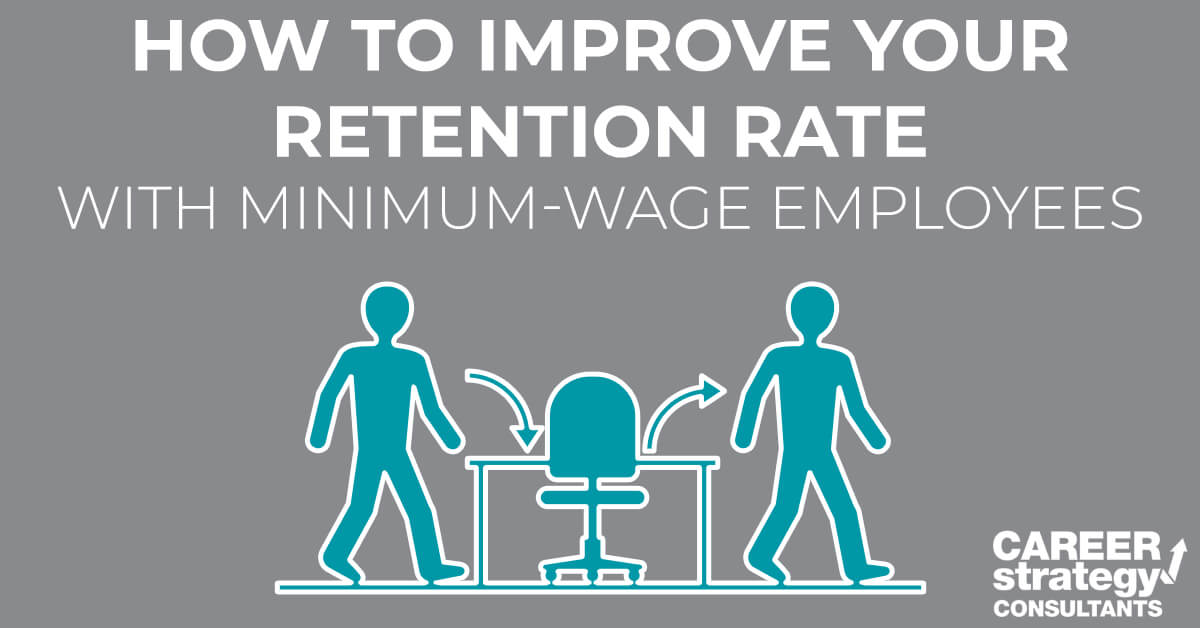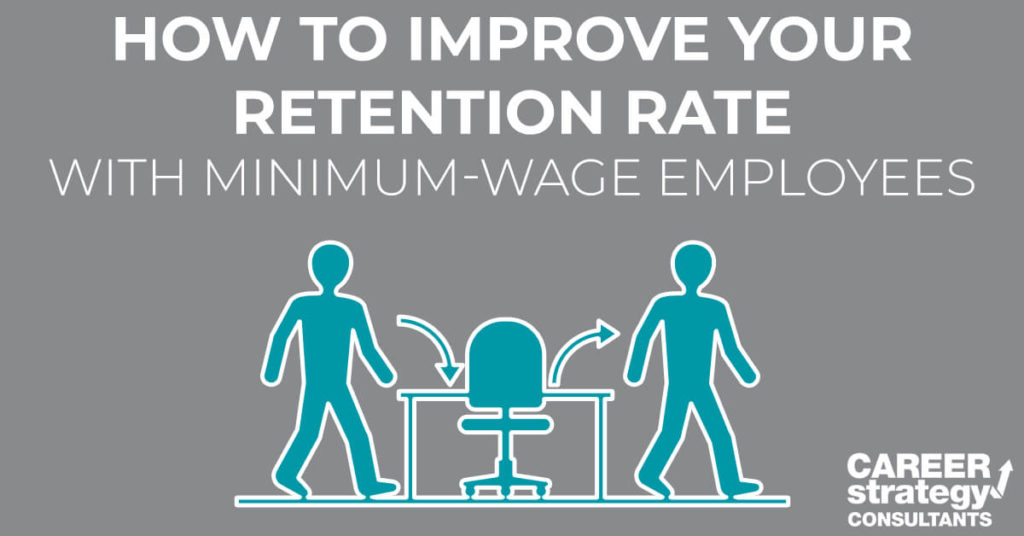How to Improve Your Retention Rate with Minimum-Wage Employees


It’s no secret that employers have a tough time holding on to their minimum wage employees. It’s frustrating for anyone with a business to maintain the stability of their workforce, but it becomes especially tough when you’re looking at an industry with high turnover rates and minimum-wage salaries.
This article will discuss how employers can retain minimum wage employees by utilizing strategies such as: employee recognition programs, establishing a positive working environment, creating an employee development program, providing training and lucrative benefit plans, offering flexibility with working remotely, and more. We’ll also provide some quick tips on how to keep your employees engaged.
Don’t let the low salaries fool you – minimum-wage employees are in high demand, and they’re not going to be hired by just any company or franchisee. These people care about getting ahead of the game, and they’re willing to work for less in order to set themselves up for future opportunities. You’ll find that most people are willing to work at a lower salary if it means that they get benefits like health care and paid sick leave.
1. Employee Recognition Programs
Employee recognition is one of the best ways to ensure your employees stick around for the long-term. When you’re looking at retention rates, you’ll find that there are a lot of different factors that go into why people leave their jobs, and in most cases, it comes down to uncaring superiors or a negative working environment. Employee recognition programs can help you keep more of your employees on board by recognizing their hard work, achievements, and loyalty.
2. Establish a One-On-One Relationship with Every Employee
A one-on-one relationship is essential for every manager, because creating this kind of relationship makes the manager more approachable and causes the employee to feel that they can come to their supervisor with their problems. Managers should take every opportunity they have to build a better personal working relationship with their employees.

3. Encourage Employees to do Their Job Well
If the employees know that they’re getting paid fairly and treated with respect, they’ll take more pride in their work. This motivation will cause them to perform better and deliver more than they would have otherwise. Praise their effort when it’s needed, but also give constructive criticism when necessary.
4. Make Sure that the Company is Growing as a Whole
If your company isn’t growing, then it won’t be around in a few years! A good manager knows that growth is crucial to the longer-term success of any business. Managers must be able to see how changes to the company’s strategy and operations will affect the overall share price. Though it’s important to focus on short-term profits, a good manager is also aware of how these profits are likely to be dwarfed by a succession of high growth periods. It’s possible for companies to make aggressive strategic decisions that don’t affect their underlying profitability too much, but which can cause them to grow rapidly anyway. You need to ensure that your company doesn’t get bogged down in these quick fixes but is instead able to move forward with clear goals and a well-considered strategy in mind.

5. Offer Flexibility with Working Remotely
One of the best ways to keep your minimum wage employees on board is to give them the option to work remotely within your company’s network. This gives them the freedom to work outside of their homes, and it allows them to save time that they would otherwise spend commuting. About two-thirds of Millennials said they are willing to move away from their parents in order to find a job that gives them more flexibility, according to The Huffington Post. As the economy continues its recovery, there will be an increase in competition for jobs, and people will look for opportunities that offer more freedom – so make sure you’re giving your employees the flexibility they want!
6. Simplify Your Business Model
One of the biggest contributing factors to employee retention is making sure that your company is able to operate at maximum efficiency. If you boil it down, there are really only three different ways for a business to make money – selling its products or services, charging others for access to a service, and offering a job. An important part of keeping employees around is ensuring that the business model allows for everyone to be paid properly without putting undue strain on profitability. The point is to find an equilibrium where everyone can be happy.
Think about the company’s purpose – what is it trying to accomplish? What are its core values? How is the company going to deal with Internet trolls? At the end of the day, your company shouldn’t be doing anything controversial, because if that happens, you’ll have a hard time retaining workers. Don’t make your employees work more than the average amount expected unless they feel like they need to fill in the additional time for you. A good employee should understand that unproductive time is still a waste for both of you. When they feel like working, let them! But when they don’t, let them relax.
8. Give Employees More Responsibility
One reason why people leave their jobs is because they feel like they’re stuck doing the same thing over and over again – which has been proven to be one of the top reasons for turnover. As you’re evaluating your employees, think about how you can help them grow as a person. If you’re going to keep them around, you need to make sure that there are opportunities for them to grow within your company’s structure. You should be giving your employees more responsibility and paying close attention to their performance in these expanded roles.

9. Reward Long-Term Loyalty
One of the most common things a business can do to retain employees is to show that they’re loyal. That means making sure that you reward employees for their continued work well after their initial commitment to the company has been made. The key is to be flexible when it comes to these issues, so don’t feel like you need to give your employees unlimited amounts of money and other benefits – it’s not necessary! One of the best ways to reward a loyal employee is with a bonus. This method works best if you have a structured bonus plan in place, so make sure that you have that in place before offering any bonuses to the company’s staff. Of course, you’ll want to give the employees more than just one bonus – they need to know that you’re going above and beyond for them.
10. Keep Your Employees Happy
Anybody who’s been through a business knows that there will be times when it feels like the employees don’t appreciate how much you care about them. In truth, this feeling can be overwhelming for some staff members, so it’s important to keep everyone feeling appreciated by doing things like: Firing a problematic employee in a timely manner. Most companies often end up wasting a lot of money on bad employees before they finally decide that they have enough of them and have to take action.
11. Keep Your Minimum Wage Employees Engaged
If you’ve ever owned a business, then you know the challenges that come along with keeping your employees engaged. For those with low-paying jobs, it’s even tougher. Many employees at minimum wage levels are not necessarily interested in the job. They may be looking for work to earn some extra cash while they continue their education or search for a higher paying job in hopes of saving money for a down payment on a home or car, or support their family. That said, many of these same employees may not feel as if they’re treated fairly by their employer. From the minimum wage to what amenities they’re receiving, many are starting to feel as if they’re not being valued. If you want to retain these employees, you’ll need to make sure that you’re meeting them where they are and making it a priority in your workplace.

12. Establish a Positive Working Environment
A lot of employers don’t take advantage of having a positive working environment in order to retain their employees. They may feel as if creating this environment is simply something that they should do “for their employees. ” I can hear them now, “They’re the ones working for me, not the other way around.” While it’s true that you need to work hard to keep your employees engaged because they are working for you, also consider the fact that they may be staying at their jobs because they enjoy their coworkers and the environment they’ve created.
The reality is this: If your employees have a great time working with you and enjoy being around their coworkers, chances are they’ll stay longer. In every employee retention program we’ve ever designed, it’s always had a positive effect on retention rates when creating a positive environment.

More Than Just Staffing
For Employers
For Individuals
